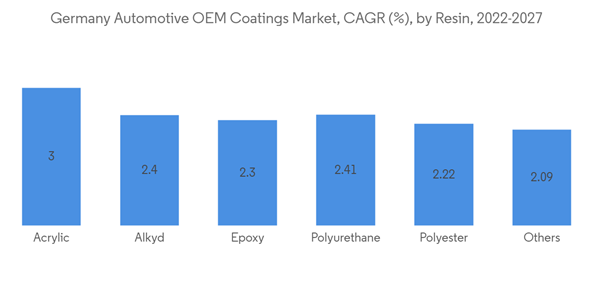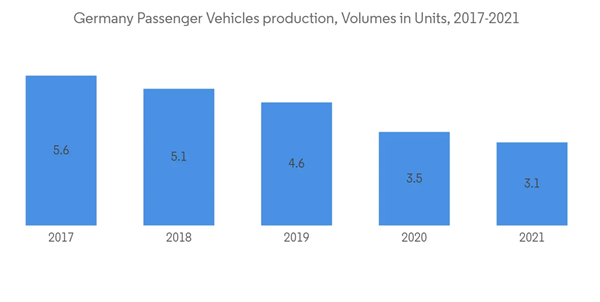The Germany Automotive OEM Coatings Market was valued at USD 410 million at the end of the year, and the market is projected to register a CAGR of 4.1% during the forecast period. The COVID pandemic negatively affected the automotive OEM coatings market as most manufacturers closed their manufacturing activities.
This product will be delivered within 2 business days.
Key Highlights
- Over the long term, the major factor driving the market studied is the preference for personal transport owing to the pandemic crisis. The consumer preference for private transport has grown over the recent years due to better development of roads and infrastructure, startup innovations in the car rental industry, and the availability of low-cost cars that are affordable for middle-class people.
- The harmful environmental impact of conventional coatings is expected to restrain the automotive OEM market in the country.
- The rising demand for electric vehicles offers various opportunities for market growth during the forecast period.
- In the application segment, the passenger vehicles segment is expected to dominate the market for automotive OEM coatings in the country.
Germany Automotive OEM Coatings Market Trends
The Acrylic Resins Segment to Register Higher Growth Rate
- Acrylic resins are polymeric materials containing acrylic monomers in the form of dispersion, solid, and solution. These monomers are usually esters of methacrylic acids, acrylics, and other derivatives.,
- Acrylic resins are used for stoving enamels for industrial appliances (machines and equipment) and primarily for automotive OEM finishes, mainly topcoats, base coats, and clear coats. They have major performance advantages regarding gloss, exterior durability, corrosion resistance, chemical resistance, solvent resistance, and hardness.
- Acrylic resins develop properties such as transparency, high color ability, and UV resistance in coating solutions. They are often used in water-borne systems, which results in low VOC emissions. The demand for water-borne acrylic resins is increasing since they are environmentally friendly products that can reduce odor and solvents used in paint. Similarly, solvent-borne acrylic resins have a homogeneous film with excellent workability and fast-drying properties. Therefore, they are used for automotive OEM applications.
- In Europe, Ford recently announced its plans to bring three new passenger electric vehicles and four new commercial electric vehicles by 2024. By 2026, the automotive company said, it wants to sell more than 600,000 EVs in the region every year and to have all sales in Europe zero-emission by 2035.
The Passenger Cars Application Segment to Dominate the Market
- Passenger cars are vehicles designed for the carriage of passengers and comprising no more than eight seats in addition to the driver’s seat. The passenger car can carry a maximum mass of 3.5 tonnes.
- Germany is one of the largest passenger car markets in Europe. In 2018 and 2019, the country’s automotive vehicle production declined. This was due to factors such as the implementation of the new Worldwide Harmonized Light-Duty Vehicles Test Procedure (WLTP) and US-China trade conflicts which decreased the international automotive demand, and EU-28's new emission standard, which mandates carmakers to achieve average CO2 emissions of 95 grams per kilometer across newly-sold vehicles.
- In 2020 passenger car production further declined from 4.7 million in 2019 to 3.8 million units in 2020 due to operational and trade restrictions resulting from the COVID-19 pandemic. The further decline of automotive OEM coatings demand in 2021 was due to the shortage of semiconductor chips, forcing manufacturers to cut down the production of vehicles. The supply chain constraints and chip shortages are expected to restrict the growth of demand for automotive OEM coatings during the forecast period.
- However, in 2022, the increasing production of electric vehicles in Germany revived the automotive OEM coatings market. According to the Federal Statistical Office, in 2021, Germany produced 328,000 units of electric vehicles worth USD 14.65 billion. Electric vehicle production increased by 85.8% as compared to 2020.
- Similarly in 2022, In Germany, the big three auto manufacturers Volkswagen, Mercedes, and BMW are investing more than USD 106 billion into scaling up an entirely new infrastructure of platforms, battery plants and software to deliver a new generation of electric vehicles.
Germany Automotive OEM Coatings Industry Overview
The Germany automotive OEM coatings market is consolidated. Some major players in the market include (not in a particular order) Akzo Noble N.V., Jotun, BASF SE, PPG Industries, Inc, and Beckers Group.Additional Benefits:
- The market estimate (ME) sheet in Excel format
- 3 months of analyst support
This product will be delivered within 2 business days.
Table of Contents
1 INTRODUCTION
4 MARKET DYNAMICS
5 MARKET SEGMENTATION (Value in USD Million)
6 COMPETITIVE LANDSCAPE
7 MARKET OPPORTUNITIES AND FUTURE TRENDS
Companies Mentioned (Partial List)
A selection of companies mentioned in this report includes, but is not limited to:
- Akzo Nobel N.V.
- Axalta Coating Systems
- BASF SE
- Beckers Group
- Jotun
- Mankiewicz Gebr. & Co.
- MIPA SE
- PPG Industries
- RPM International Inc.
- The Sherwin Williams Company










